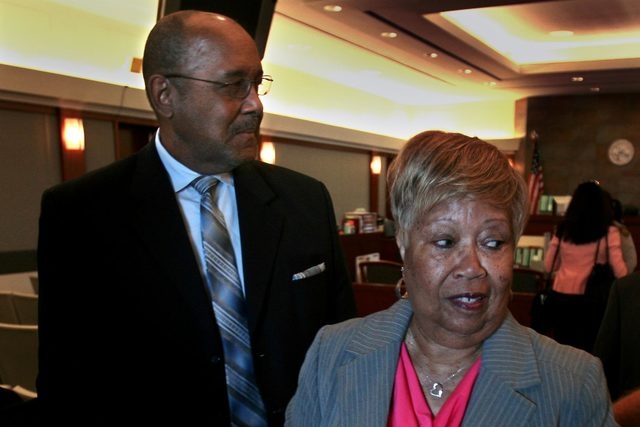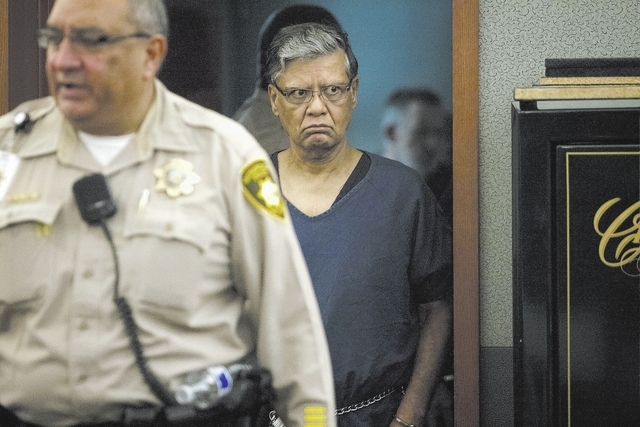Second victim dies from hepatitis C outbreak at Dr. Desai’s clinic
A second hepatitis C victim in the criminal case against Dr. Dipak Desai has died.
Michael Washington, 73, who testified during this year’s trial of Desai and nurse anesthetist Ronald Lakeman, died of complications from the blood-borne virus in Dallas on Aug. 23, according to his Las Vegas lawyer, Ed Bernstein.
“The doctors told his wife that he died of liver and kidney failure, which they believed to be the result of the hepatitis C infection. He was just a kind and gentle giant.”
Bernstein said a large crowd was at a memorial service for Washington on Aug. 30 in Las Vegas, where he also maintained a residence.
In a tribute handed out to mourners, his wife of 32 years, Josephine, described Washington as the love of her life and soul mate.
“We were blessed to have a wonderful life together,” she wrote. “Your life’s race was well-run, life’s work well-done, life’s crown well won and now you can rest, no more pain. I love you so much.”
Chief Deputy District Attorney Mike Staudaher, lead prosecutor in the criminal case, said Thursday he was informed of Washington’s death and was attempting to obtain more information.
The death could lead to additional murder charges against Desai and Lakeman, who were at the center of the 2007 hepatitis C outbreak, one of Southern Nevada’s worst medical calamities.
But Staudaher said it was too early to determine whether prosecutors will seek new charges.
District Attorney Steve Wolfson echoed those words, saying, “Our prayers go out to the Washington family. We’re waiting on additional information to be provided to our office, and we’re going to make a decision based on what’s in the best interest of our community.”
After nearly two months of testimony, a jury on July 1 convicted Desai, 63, of all 27 criminal counts related to the outbreak, including second-degree murder in the death of another infected patient, Rodolfo Meana, 77.
Lakeman, 66, was acquitted on the murder charge and other charges tied to Meana’s April 2012 death, but found guilty of 16 other counts.
Lakeman was not directly involved in Meana’s colonoscopy, but both Lakeman and Desai handled Washington’s procedure, prosecutors said.
The two defendants, who are being held at the Clark County Detention Center, were to be sentenced Thursday before District Judge Valerie Adair. The proceeding was continued until Oct. 24, however, to allow state probation officers more time to prepare. Adair denied a motion by defense lawyer Rick Santacroce to release Lakeman on bail until the new sentencing date.
Santacroce and one of Desai’s defense lawyers, Margaret Stanish, declined to comment on Washington’s death.
Both Desai and Lakeman are facing lengthy prison terms as a result of their convictions in the outbreak.
Desai also is waiting to be tried on federal health care fraud charges.
The hepatitis infections of Washington and Meana were among seven linked by health officials genetically to Desai’s now-closed Endoscopy Center of Southern Nevada on Shadow Lane. Washington contracted the virus after his colonoscopy at the clinic on July 25, 2007, and Meana was one of six patients infected during procedures on Sept. 21, 2007.
The Washingtons were among the first witnesses to testify for prosecutors in the high-profile outbreak trial.
Josephine Washington, a nurse, broke down on the witness stand, accusing Desai of ruining the life of her husband, a 20-year veteran of the U.S. Air Force.
She erupted into tears after a prosecutor asked what she and her husband were doing with a $25.4 million settlement they received in a civil lawsuit over her husband’s hepatitis infection.
She testified that her husband spent most of his time seeing specialists for a long list of ailments, including liver and stomach problems tied to the virus.
A sometimes confused Michael Washington told the jury how he developed symptoms of hepatitis C — yellowing in his eyes, loss of weight, abdominal pain and dark urine — a few weeks after Desai performed the colonoscopy on him.
Washington said he had trouble eating and walking and had to have fluid drained from his bloated abdomen every week because of his malfunctioning liver.
The guilty verdicts were thought to have closed the book on one of the largest and most complicated investigations undertaken by Las Vegas police. But Washington’s death may add another chapter.
The investigation was launched in March 2008 after health officials disclosed the outbreak and urged some 64,000 patients to get tested for blood-borne viruses.
Desai and Lakeman were originally indicted with another nurse anesthetist, Keith Mathahs, in June 2010. Mathahs, 77, pleaded guilty and testified for the prosecution.
The charges, which included criminal neglect of patients and insurance fraud, focused on the cases of the seven infections health officials tied to the endoscopy center.
Prosecutors added the second-degree murder charge after Meana’s death. During the trial, they played a March 2012 videotaped deposition of Meana taken before he flew to his native Philippines to spend his remaining days.
Like Washington, Meana’s liver and kidneys failed him after he was infected with the hepatitis C virus.
Prosecutors contended throughout the trial that unsafe injection practices involving the anesthetic propofol led to the hepatitis C outbreak. The combination of double-dipping syringes into propofol bottles used on multiple patients spread the virus from source patients infected with hepatitis C on the two different dates in 2007, prosecutors contended.
Desai was portrayed as a penny-pincher who ran his clinic like an assembly line, recklessly churning out procedures at the expense of patient care.
Defense lawyers argued that the prosecution theory was not rock solid and that other means of transmission, including dirty scopes and biopsy instruments, were possible. They maintained the defendants followed injection practices accepted throughout the medical community and did not know they were risking the health of their patients.
Both defendants are expected to appeal their convictions to the Nevada Supreme Court.
Despite suffering several strokes, Desai was declared competent to stand trial. His lead defense lawyer, Richard Wright, however, maintained during the trial that Desai was not able to properly assist in his own defense.
Prosecutors suggested Desai was exaggerating his physical impairments in a ploy to escape a stiff prison term.
Desai, who surrendered his Nevada medical license after health officials disclosed the outbreak, and Lakeman could face the rest of their lives in prison.
“This is one of the most important cases this community has seen in many, many years,” Wolfson said after the verdict. “Our prosecutors will seek a stiff sentence, including significant prison time.”
Wolfson said Desai by statute faces a potential sentence of 34½ years to life in prison and Lakeman could receive a sentence of 15 to 69 years behind bars.
Mathahs, who is free on bail, faces 28 to 72 months in prison under a deal worked out between his lawyer and prosecutors. He is to be sentenced on Oct. 31.
Contact reporter Jeff German at jgerman@reviewjournal.com or 702-380-8135. Follow him on Twitter @JGermanRJ.




















